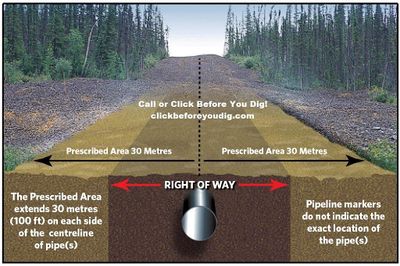Regulation
Regulations are rules established by a government with the force of law to prevent or encourage certain activates. They are enforced by a regulatory body (also created by a government) which monitors a specific activity or industry.[2] Regulations are usually specific to an industry or activity as is the regulatory body that enforces the regulations. Regulations are designed to constrain or prevent certain activities that have harmful effects or create externalities which can lead to a market failure. Some examples of negative effects from activities are smoking and pollution, each has its own laws and regulatory body to enforce these laws.
A regulation can also be used to encourage certain activities which create a social benefit or positive externality. For example, the Alberta Environmental Protection and Enhancement Act requires mining companies to reclaim mines that have been exhausted and the land surrounding them.[3] This regulation encourages companies to be environmentally conscious and returns an area to its natural state.
Regulatory bodies are created by a government and monitor in compliance with the laws. A regulatory body is able to penalize companies which violate the rules and initiate legal proceedings in severe cases. Regulatory offenses are within the realm of administrative law.[4]
Regulatory bodies can be national such as the National Energy Board (NEB), state or provincial such as the Alberta Energy Regulator (AER) and in some cases international such as the International Atomic Energy Agency (IAEA).
In some cases certain industries may not be large enough to merit their own regulatory body or are so specialized that they require a vast amount of specific knowledge to regulate. These industries and activities still have to comply with the existing laws and are said to be self-regulating.[5] The obvious problem with self-regulation is that the firm which is supposed to make sure it complies with laws has the incentive not to do so. Firms tend to only pay attention to their own costs and not to the social cost or harm that can result from their activities. For this reason, self-regulation not always the most effective method.
The Good, Bad and the Necessary
There are pros and cons to regulation, the pros are obvious, regulation prevents activities which can cause harm to society as a whole whether it is pollution, alcohol, firearms or financial services.
All this regulation has an effect on the market however, when a market is restricted it becomes inefficient. In many cases this can be fixed with other government action such as subsidies and other measures but in some cases the inefficiency is acceptable or necessary in order to ensure the welfare of the majority of the society.[6]
For More Information
- [www.qp.alberta.ca/documents/Acts/E12.pdf Environmental Protection and Enhancement Act (EPEA)]
See Also
References
- ↑ National Energy Board, online (Accessed September 4th, 2016), Available: https://www.neb-one.gc.ca/sftnvrnmnt/dmgprvntn/dmgprvntntrch-eng.html
- ↑ The Economist. “Regulation.” [Online], Available: http://www.economist.com/economics-a-to-z/r#node-21529809[June 1, 2016].
- ↑ Alberta Energy Regulator, "Acts, Regulations & Rules." [Online], Accessible: http://www.aer.ca/rules-and-regulations/acts-and-rules, 2016 [June 1, 2016]
- ↑ J.Black, N. Hashimzade, and G. Myles. (2009) "Regulation." [Online], Available: http://www.oxfordreference.com/view/10.1093/acref/9780199237043.001.0001/acref-9780199237043-e-2641?rskey=DVqTX1&result=1, 2009 [June 1, 2016]
- ↑ J.Black, N. Hashimzade, and G. Myles. (2009) "Self-Regulation." [Online], Available: http://www.oxfordreference.com/view/10.1093/acref/9780199237043.001.0001/acref-9780199237043-e-2806#, 2009 [June 1, 2016]
- ↑ The Economist. "Regulation." [Online], Available: http://www.economist.com/economics-a-to-z/r#node-21529809 [Sep 3, 2016].


